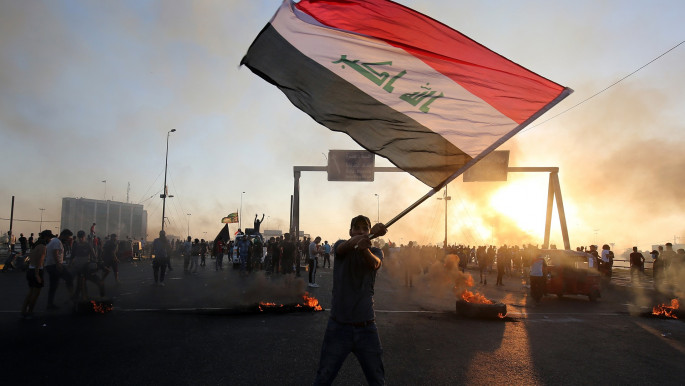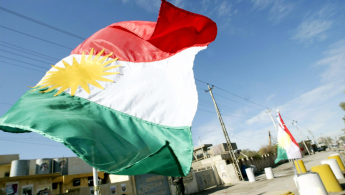In Iraqi Kurdistan, plunging oil prices raise fears of economic collapse
Nestled in his armchair in an elegant café of Erbil, he shrugs his shoulders. "I cannot say I was not expecting it. Since a few weeks I was not receiving any direction from my managers. Oil is mainly used for transportation and for energy, and with the pandemic and the confinement measures, the majority of the income is gone."
Since oil prices plummeted by 60 percent compared to February 2020, Iraq and the Kurdistan Region have been confronted with a dramatic economic situation, as 90 percent of their revenue depends on crude oil.
Then in mid-April, the federal government decided to stop paying the Kurdistan Region its share of the national budget and asked them to return all payments since January 2019, claiming Erbil had failed to submit 250,000 barrels of oil per day to Iraq's State Organization for Marketing of Oil (SOMO).
The decision threw the KRG even deeper into crisis, as the monthly allowance from Baghdad corresponds to 50 percent of public salaries in the Kurdistan Region.
 |
A crash in oil prices has plunged Iraqi Kurdistan into economic crisis |  |
"The Kurdish economy was slashed by more than 90 percent since the recent oil price crash," declared KRG Prime Minister Masrour Barzani. "In April, the KRG received only 30 million dollars net revenue from its dependent oil exports, whereas until January it was receiving more than 300 million dollars net revenue (more than 700 million dollars gross revenue) per month".
Barzani said internal revenues were 60 billion Iraqi dinars in April ($50.5 million) and used to be more than 220 billion Iraqi dinars ($185 million) on average before the crisis.
"Oil sales to international markets count for 45 percent of Kurdistan's revenue," explained Mohammed Husein, policy director at the Iraqi Center for Policy Analysis and Research.
 |
|
| Read more: Saudi Arabia's flooding of the oil market could spell disaster for Iraq |
But oil prices affect all sectors of the economy, as the majority of companies mostly rely on government contractors and receive service fees each month.
November 2019 was the last time the KRG paid international companies their normal due for service fees. Until March 2020, the KRG was still able to pay some services, because it has shares in foreign oil companies, then this stopped too.
"We lost probably 20-30 percent of our monthly sales," despaired Sevar Dleir, General Manager of PetroAlliance, an oilfield services company based in Erbil.
"We didn't experience such a situation during ISIS, nor the referendum, this is the worst situation. As we had a great 2019, so far we announced salary cuts between 10 and 15 percent and we will release 10-15 people in total. But in May we will definitely be negative, and we will have to proceed with those measures. I foresee this year is going to be 30 percent less than last year, 10 percent less than an average year such as 2018".
Even private businesses not working for the government were hugely impacted, such as service companies for households. Of course, they still depend on normal customers.
If more than 45 percent people work for the government, and the government cannot pay them, it means they don't have enough liquidity to go shopping in the markets. The economy has contracted on a whole and service sales have decreased by more than 50 percent.
 |
Baghdad has stopped paying the Kurdistan Region its share of the national budget, throwing the KRG even deeper into crisis |  |
"People here are very sensitive to signals of economic crises, because they have undergone a lot of previous crises and economic sanctions," Husein told The New Arab. "Although in normal times they can spend recklessly, they respond very quickly and urgently by starting to save money".
Not the right time to diversify the economy
In mid-May, the KRG cabinet hastened to announce plans to diversify the economy by investing more in agriculture, industry and tourism, in order not to rely on oil entirely. The resolution was met with scepticism. "I remember Nechirvan Barzani saying a few years ago already that Erbil would become the new Dubai," laughed Dana. "And then what did they do? They built some fancy skyscrapers here and there, and that's it," he said bitterly.
"Anyway, this is not the time," Husein said. "KRG water and land sources are perfect, but the government would need to incentivise farmers, install food industry factories, give them financial aid and create a market for their products. All that needs capital to invest, and the KRG simply does not have money for this. This might be possible when oil prices are above 65-70 dollars per barrel. In any case, I hope they learnt from the 2014 crisis," he warned.
 |
|
| Read more: Oil price truce: The Russia-Saudi standoff is over. But at what cost? |
Due to the oil price crash, the KRG decided to diversify and tried to raise money by increasing the price of electricity by 300 percent and imposing some income taxes on labour. As a consequence, about 80 percent of industrial projects moved to Baghdad and other federal Iraqi provinces, where they could get subsided electricity for factories.
"I am afraid the KRG might do this again, they haven't come up with any other decisions and they desperately need money, so I would expect them to make wrong decisions," added Husein.
Through 2015 and 2016, the losses were much bigger than any gain. Then, the Kurdish Government tried some tax exemption policies and created incentives to make some factories come back. The local economy recovered in 2018-2019.
"Today, companies still have to pay a little more than in Federal Iraq to stay in KRG, but they will not risk being harassed by militias or dealing with security issues. The business environment is safer here, if government policies won't make it risky," Husein said.
According to experts, the KRG also needs a functional banking system; technology is very old, as is the mindset of a sector of the leadership. In short, they need to digitalise. "Our main problem is now getting our own cash from banks," said Sevar Dleir.
 |
The KRG can still mitigate with structural reforms and by reaching an agreement with Baghdad. There are solutions, but none of them are short-term |  |
"The banking system completely stopped because of the curfew. It's poorly computerised, and central bank is not distributing money to the local banks. It's not our company having a cash flow problem but banks not paying us. It's a vicious circle".
Iraqi Kurdistan also has to undergo a huge structural reform. "It cannot function this way, it is not sustainable at all," Husein said. "They have to reduce the public sector, do some regulations to stimulate private business markets and reform the bureaucracy".
Reducing corruption would bring back lots of resources to the KRG. According to Deputy Prime Minister Qubad Talabani, the KRG has more than 250,000 ghost employees, receiving salaries every month without ever showing up for work.
"And numbers might be bigger than the government admits," warn several experts. "There are big inequalities in public sector salaries. Some receive eight million Iraqi dinars ($6,700) per month, others 400,000 Iraqi dinars ($335) per month".
Although oil market volatility and low oil prices are an external shock out of their control, and despite several factors constantly changing like Covid-19 measures, the KRG can still mitigate with structural reforms and by reaching an agreement with Baghdad. There are solutions, but none of them are short-term.
*not his real name
Sofia Nitti is an Italian video journalist based in Erbil, Iraq
Follow her on Twitter: @SofiaNitti



